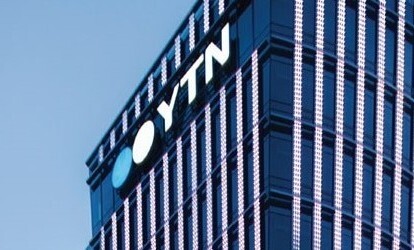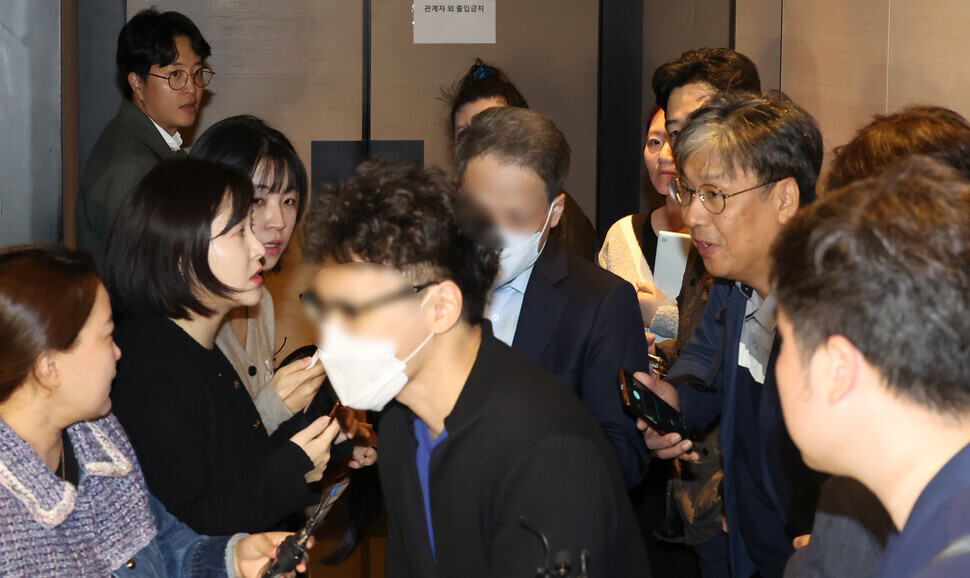hankyoreh
Links to other country sites 다른 나라 사이트 링크
Why national media union is calling sale of Korean news channel YTN illegal

The Eugene Group has been selected as the business that will be acquiring the public enterprise portion of the news channel YTN’s shares.
If the Korea Communications Commission determines there are no issues in terms of the group’s purpose for acquiring the shares, its approval will make the group YTN’s biggest shareholder. Having maintained a public ownership structure ever since the acquisition of shares by KEPCO KDN and other public enterprises during the Asian financial crisis in 1997, YTN is poised to pass into the hands of a private business for the first time in 26 years.
On Monday, the parties to the sale of YTN shares, KEPCO KDN and the Korea Racing Authority (KRA), announced that they were selling their combined 30.95% stake in the network to the Eugene Group.
In addition to the group, the bidding included two other participating companies — Hansae and the Global Peace Foundation — when it closed on Friday. Of the three, the Eugene Group put in the highest bid at around 320 billion won.
Eugene is a medium-sized group with around 50 affiliates working in areas including construction materials and distribution, finance, logistics and information technology, and leisure/entertainment.
According to the Broadcasting Act, the Eugene Group must apply for majority investor alteration approval from the KCC within 30 days of signing its acquisition contract following its winning bid on Monday.
The Korea Communications Commission is to conduct a review on areas including ability to fulfill the public responsibility, fairness, and public interest roles of broadcasting, along with corporate financial capabilities and other legal prerequisites. Results are to be announced to the applicant within 60 days of the application’s receipt.
The privatization of YTN began gathering momentum after a November 2022 decision by the Ministry of the Economy and Finance to approve a “public institution asset efficiency promotion plan” in which public enterprises such as KEPCO KDN (an affiliate under KEPCO’s 100% ownership) and the KRA would sell off their combined 30.95% stake in the network.

At the time the government finalized this efficiency plan, KEPCO KDN expressed reluctance to sell off its stake as YTN’s majority shareholder. It ended up obliged to change its tune after a Ministry of Trade, Industry and Energy recommendation urging it to “reconsider the sale.”
In November and December of last year, KEPCO KDN and the KRA held board meetings to approve the sale of their shares.
The process of selecting a company to supervise the two public enterprises’ selloff was not a simple one.
After KEPCO KDN refused to comply with several selections by the company overseeing the sale, the KRA responded to the lack of takers — despite multiple bidding advertisements by the supervising company — by finally entrusting sale duties last May to Samil PwC, the company overseeing KEPCO KDN’s sale of shares.
This prompted a warning from the YTN chapter of the National Union of Media Workers and others, which said that the share prices would inevitably differ for the KRA and for KEPCO KDN — which as majority shareholder enjoys a premium in terms of management rights — and that any attempt to sell both enterprises’ shares simultaneously would inevitably lead to controversy over a possible “giveaway” or poorly handled sale.
The same day, the union and its YTN chapter held a press conference in front of the Grand Hyatt Seoul hotel, where the bid examination was conducted.
Explaining that everything from the decision to sell off shares in YTN to the selection of a sale supervision company and the sale method had been marred by illegalities, they called on the National Assembly to perform a parliamentary audit.
“We stand here at the scene of a crime that repudiates press freedoms, where a public ownership structure founded on broadcasting fairness and the public service role of media is being dismantled and networks are threatened with being sold off to ruin when they do not please those in power,” said Yoon Chang-hyun, the head of the National Union of Media Workers.
“The presidential office and all the government officials who exercised tangible and intangible pressure on the sale process will be held judicially accountable,” he warned.
By Choi Sung-jin, staff reporter; Kim Kyung-rak, staff reporter
Please direct questions or comments to [english@hani.co.kr]

Editorial・opinion
![[Editorial] Intensifying US-China rivalry means Seoul must address uncertainty with Beijing sooner than later [Editorial] Intensifying US-China rivalry means Seoul must address uncertainty with Beijing sooner than later](https://flexible.img.hani.co.kr/flexible/normal/500/300/imgdb/original/2024/0517/8117159322045222.jpg) [Editorial] Intensifying US-China rivalry means Seoul must address uncertainty with Beijing sooner than later
[Editorial] Intensifying US-China rivalry means Seoul must address uncertainty with Beijing sooner than later![[Column] When ‘fairness’ means hate and violence [Column] When ‘fairness’ means hate and violence](https://flexible.img.hani.co.kr/flexible/normal/500/300/imgdb/original/2024/0516/7417158465908824.jpg) [Column] When ‘fairness’ means hate and violence
[Column] When ‘fairness’ means hate and violence- [Editorial] Yoon must stop abusing authority to shield himself from investigation
- [Column] US troop withdrawal from Korea could be the Acheson Line all over
- [Column] How to win back readers who’ve turned to YouTube for news
- [Column] Welcome to the president’s pity party
- [Editorial] Korea must respond firmly to Japan’s attempt to usurp Line
- [Editorial] Transfers of prosecutors investigating Korea’s first lady send chilling message
- [Column] Will Seoul’s ties with Moscow really recover on their own?
- [Column] Samsung’s ‘lost decade’ and Lee Jae-yong’s mismatched chopsticks
Most viewed articles
- 1For new generation of Chinese artists, discontent is disobedience
- 2[Editorial] Transfers of prosecutors investigating Korea’s first lady send chilling message
- 3[Exclusive] Unearthed memo suggests Gwangju Uprising missing may have been cremated
- 4[Editorial] Intensifying US-China rivalry means Seoul must address uncertainty with Beijing sooner t
- 5S. Korea “monitoring developments” after report of secret Chinese police station in Seoul
- 6N. Korean media upgrades epithet for leader’s daughter from “beloved” to “respected”
- 7Yoon says concern about biased diplomacy is being incited by “communist totalitarian forces”
- 8[Column] US troop withdrawal from Korea could be the Acheson Line all over
- 9Xi, Putin ‘oppose acts of military intimidation’ against N. Korea by US in joint statement
- 1060% of young Koreans see no need to have kids after marriage